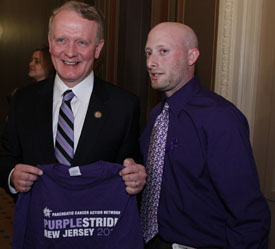Todd Cohen's goal is to double the five-year survival rate from 6 percent to 12 percent by 2020

In 2001, a wrecking ball called pancreatic cancer slammed into Todd Cohen’s family. Although the 1998 Rutgers graduate is still reeling from its destruction, he has found a way to channel some of the pain.
He was 26 when his father was diagnosed with the disease. When Richard Cohen died 12 months later, Todd found himself looking at a lifetime of Fathers Days without the man who’d nurtured him, and seeking ways to ensure that other young people would not share that grim future.
“I became an activist because I didn’t want anyone else to go through the same agony,” says the Edison resident, who recently was named Media Representative of the Year by the Pancreatic Cancer Action Network.
With 75 affiliates nationwide, the network offers patient support and community outreach while advocating for increased research and an ultimate cure. Lisa Niemi, wife of the actor and dancer Patrick Swayze, presented the award at the organization’s recent national leadership conference in Dallas.
Swayze is just one of the most visible of the cancer’s victims. Pancreatic cancer also has claimed the lives of the writer Ralph Ellison; the anthropologist Margaret Mead; FBI director L. Patrick Gray; and Randy Pausch, the Carnegie Mellon professor whose Last Lecture, a huge best-seller, outlined his struggles with the disease.
If you’re a New Jersey resident who sees something about pancreatic cancer in your local newspaper, Cohen probably got it there.
In addition to reaching out to the media with his message, Cohen also was a member of a group that traveled to Washington for the re-introduction of the Pancreatic Cancer Research & Education Act when N.J. Rep. Leonard Lance (R-7) signed on to spearhead the bill in the House of Representatives.
The federal measure aims to provide a more targeted approach for fighting the disease by arming scientists with enhanced resources.
“Our goal is to double the five-year survival rate from 6 percent to 12 percent by 2020, although even 12 percent is not an acceptable number,” says Cohen, a special education teacher in West Orange.
“If people could see how deadly a disease this truly is, they might let their local politicians know that more resources should be mustered against it,” he adds. “Pancreatic cancer gets only 2 percent of the National Cancer Institutes’ budget, and it needs more, much more.”
According to the network’s figures, pancreatic cancer is the fourth leading cause of cancer death in the United States – and one of the few cancers for which the survival rate has not significantly improved over the past four decades.
In 2010, an estimated 43,000 were diagnosed with pancreatic cancer in the United States, and 37,000 people died from the disease. The average life expectancy after receiving the diagnosi: three to six months.
“It’s a difficult disease to advocate for, because there aren’t many survivors to be activists,” Cohen observes. “It’s usually loved ones who get the ball rolling.”
For the Cohen family, the ordeal began when Richard Cohen, a 1964 Rutgers–Newark graduate and a professor of anatomy and psychology at Union County College, started experiencing abdominal pain and jaundice.
A referee for high school baseball, softball, basketball, and volleyball, “He was a very busy, busy guy,” Todd Cohen remembers, “but always willing to share his love for sports and his sense of humor with his family. He’d never had medical problems before, yet he knew deep inside that something was terribly wrong.”
After initial biopsy came back negative, follow-up tests told a darker story. The elder Cohen died in July 2002, three months shy of his 60th birthday.
“To lose your father in your mid-twenties is such a crushing blow,” says Cohen, who majored in political science and journalism at Rutgers, with a minor in psychology.
He recalls sitting by his dad’s bedside as the chemo dripped into his arm. He remembers the last gift he bought his dad for their last Father’s Day – a Mickey Mantle jersey – and the first Father’s Day he spent visiting the Newark cemetery where Richard Cohen is buried.
In 2007, when he received an email looking for volunteers for a new Garden State affiliate of the Pancreatic Cancer Action Network, there was no question where he belonged.
That affiliate, about 30 active members strong, meets monthly at the Bloomingdales in the Mall in Short Hills. In addition to promoting the cause at health fairs and parades statewide, the local activists sponsor a yearly fundraising walk called PurpleStride New Jersey; this year’s is on November. 6, in Parsippany.
The affiliate also sponsors an annual baseball game with the Somerset Patriots as a Pancreatic Cancer Awareness Day. Last year, 500 people turned out for the game. “There was a sea of purple, our official color,” Cohen recalls. “You would have thought it was a Barney convention.”
Over the years, he’s been repeatedly moved by the support he’s found for his crusade, support that makes the hours he spends on the road, at the computer and in meetings worthwhile.
“It reminds me that people’s hearts are so large, and that what they do can have a lasting effect,” Cohen says.